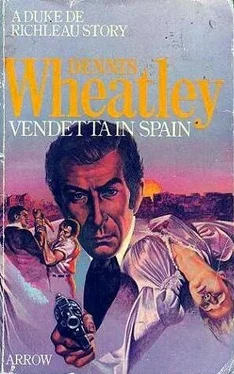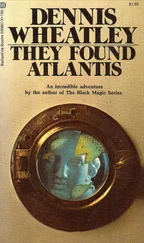For a few tense moments the Count seethed with real rage, but of the fierce and internal variety. Whether Ferrer's outburst was genuine or not, clockwork infernal machines were never used in mines. The two young men were making a bomb, and there could be little doubt how they meant to use it. There could be little doubt either that it was here, in this laboratory, that Morral had learnt how to make the sort of bomb that had killed Angela. And it was more than likely that it was the Ferrers who had taught him how to do so. At the thought de Quesnoy clenched his hands until the nails dug into his palms and his knuckles went white. He felt a terrible temptation to whip out the little revolver he always carried and shoot them where they stood.
With a great effort he mastered it. To execute two men who he felt convinced had played a part in bringing about Angela's death would give him a grim satisfaction; but if he held his hand for the moment he now had a lead which might enable him to destroy the whole brood of assassins root and branch, and that would be a far more fitting memorial to her.
His brain clicked over. He had the lead, but if he did not take it at once it might be lost. Still outwardly calm, and ignoring what Ferrer had said about a mine, he stepped over to the slab, picked up the works of the little clock and remarked:
T wonder that you still use these things. Their ticking often gives them away so that they are discovered before they are timed to go off. It is far better to use a small phial of acid which, in a given time, eats through its container, and then a thin wire, the snapping of which detonates the bomb.'
For a moment there was a stunned silence, while the brothers stared at him uncertainly, then he added with a smile, 'My cousin is a nihilist and at his home in Odessa I sometimes used to help him make his bombs; so I know quite a lot about such things.'
Both brothers gave a sudden sigh of relief, then the face of the elder lit up and he exclaimed, 'Then you are one of us! Welcome to Barcelona, Senor Chirikov; it is a pleasure to meet you.'
Ferrer had remained scowling in the background. Now he burst out: 'You young fools. I've warned you time and again to stop associating with the militants. You'll end by getting yourselves shot. I warn you, too, Senor Chirikov. Have nothing to do with these young hotheads. I make no secret of my views, but we'll not achieve our ends by violence.'
The sandy-haired Benigno turned to de Quesnoy. 'Sanchez and I are sorry to disagree with our father, but he is old-fashioned and out-of-date. We'll get nowhere by just talking. We've done little else for far too long. Our only hope lies in Propaganda by Deed and in terrorizing all those who attempt to suppress us.'
'Right or wrong,' Ferrer declared harshly, 'I'll not allow you to use this house to make engines of destruction. Take your things, or better still, render them safe, and throw them in the dustbin, then get out. Now, Senor Chirikov, come with me and I will show you the rest of our premises.'
'One moment, Father,' the black-browed Sanchez intervened. 'I'd like to hear something about the Russian nihilists at first hand, and I'm sure Benigno would too. What about having a drink with us this evening, Senor Chirikov?'
'I should be happy to,' de Quesnoy replied, with difficulty concealing his elation at this chance to win the confidence of two active anarchists. 'Where shall we meet?'
'It would be better still if the Senor would dine with us,' suggested Benigno. 'We'd have longer to talk then, and could go out to the Font de Lleo at Montjuich.'
On de Quesnoy's accepting, as the restaurant was some way outside the town, it was arranged that the brothers should pick him up at seven o'clock near the Columna de Colon, which was not far from his pension. Then, having said good-bye to them for the present, he accompanied the now sullen Ferrer on a tour of the library, the foundry, the kitchens and the publishing part of the establishment.
When, nearly an hour later, he left the Escuela Moderna he had plenty to think about, and the problem uppermost in his mind was the question whether Ferrer was genuinely opposed to violence or had been playing a part. He had certainly appeared to be in earnest, and Benigno's attitude to his father supported a belief that he had been. On the other hand, if Ferrer's sons had been using the laboratory against his express wishes it seemed strange that they had not at least taken the precaution of locking themselves in before getting to work. If, too, Ferrer's was, in fact, the brain that plotted and directed the anarchist outrages it would be a matter of the first importance that he should be protected from the least breath of suspicion; so it might well be that Benigno had played up to him on a well-established procedure of always making him appear before strangers as only a propagator of anarchist theory. Whichever might prove to be the case, the Count felt that his luck had been very much in that morning and that he could look forward to a promising evening.
By five to seven he was standing outside the Museo Marftimo opposite the towering column erected to the memory of the discoverer of America; but few Spaniards have much regard for punctuality, and it was nearly half past before the brothers, without apology for their lateness, but with cheerful greetings, picked him up in a one-horse coche.
Montjuich is a great hill rising to six hundred feet in height on the western outskirts of Barcelona. Towards the sea its side is almost sheer, so the approach to its summit has to be made from the landward side, and even there the slope upward round a succession of hairpin bends is so steep that de Quesnoy felt pity for the poor lean horse drawing them and, half-way up, insisted on getting out. The Ferrers thought his conduct strange, but attributed it to Russian eccentricity, and good-naturedly joined him.
At the top of the hill they got into the carriage again and drove through pines, palms and tamarisks towards its southern slope, on which stood the restaurant. From its terrace there was a fine view of the great rambling castle that for centuries had dominated Barcelona, and one could see for many miles out to sea.
Even before they sat down at one of the tables in the garden, the clothes of people at others and the waiters hurrying about in spotless white aprons told de Quesnoy that it was a much more expensive place than he had expected the Ferrers to take him to, and he wondered that they could afford it.
For a moment he put it down to Spanish pride in showing a foreigner round, coupled with a generous desire to do him well; but, in spite of the rather shoddy suits all three of them were wearing, the head waiter hurried up to take their order, and it then emerged that the brothers often came there on Sundays in the summer. That caused the Count to think again, and he recalled the fact that in Russia it was common knowledge that the nihilists not only committed assassinations, but also robbed banks and blackmailed wealthy people. They justified such crimes by saying that they were committed as their only means of raising funds to continue their political campaign and support their comrades who were in hiding. But de Quesnoy thought it probable that in some cases a part of the proceeds was kept back; and he had no reason to suppose that the activities and morals of the Spanish anarchists differed much from those of the Russian nihilists.
As the evening advanced he formed the opinion that Sanchez, anyhow, was in the movement mainly for what he could get out of it. The burly, coarse-featured young man gulped down the rich dishes he had ordered with a zest that implied that he could not have enough of them, and each time he filled his mouth with wine his eye roved round the prettier of the women at the nearby tables. In Spain no respectable woman then ever took a meal in public; so the majority of them were the better class of kept girls out for the evening with their mostly middle-aged lovers, and two of them, no doubt attracted by Sanchez's fine physique, covertly returned his glances. Although he did not actually say so his attitude clearly conveyed that this was the sort of life he visualized himself living when equality for all had been achieved, and that he would be entitled then to the best of food and wine all the time, with no nonsense about any monied "class having first call on the prettiest women.
Читать дальше












